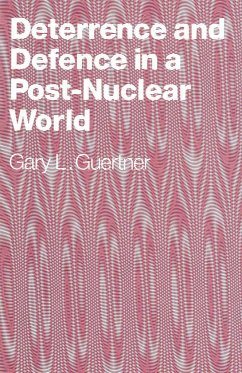Gary L. Guertner
Deterrence and Defence in a Post-Nuclear World
Gary L. Guertner
Deterrence and Defence in a Post-Nuclear World
- Broschiertes Buch
- Merkliste
- Auf die Merkliste
- Bewerten Bewerten
- Teilen
- Produkt teilen
- Produkterinnerung
- Produkterinnerung
This book studies the obstacles to conventional deterrence, deterrence Soviet style, Soviet incentives for conventional deterrence and arms control.
Andere Kunden interessierten sich auch für
![The Foundations of Defensive Defence The Foundations of Defensive Defence]() Anders BoserupThe Foundations of Defensive Defence52,99 €
Anders BoserupThe Foundations of Defensive Defence52,99 €![Us-West European Relations During the Reagan Years Us-West European Relations During the Reagan Years]() Steven K. SmithUs-West European Relations During the Reagan Years38,99 €
Steven K. SmithUs-West European Relations During the Reagan Years38,99 €![The Great Power Triangle The Great Power Triangle]() Gerald SegalThe Great Power Triangle56,99 €
Gerald SegalThe Great Power Triangle56,99 €![Nuclear Weapons - The Balance of Terror Nuclear Weapons - The Balance of Terror]() A J CwardsNuclear Weapons - The Balance of Terror102,99 €
A J CwardsNuclear Weapons - The Balance of Terror102,99 €![An Introduction to Strategic Studies An Introduction to Strategic Studies]() Barry BuzanAn Introduction to Strategic Studies61,99 €
Barry BuzanAn Introduction to Strategic Studies61,99 €![The North Atlantic Alliance and the Soviet Union in the 1980s The North Atlantic Alliance and the Soviet Union in the 1980s]() Julian CritchleyThe North Atlantic Alliance and the Soviet Union in the 1980s76,99 €
Julian CritchleyThe North Atlantic Alliance and the Soviet Union in the 1980s76,99 €![The United Nations in the 1990s The United Nations in the 1990s]() Peter R. BaehrThe United Nations in the 1990s38,99 €
Peter R. BaehrThe United Nations in the 1990s38,99 €-
-
-
This book studies the obstacles to conventional deterrence, deterrence Soviet style, Soviet incentives for conventional deterrence and arms control.
Produktdetails
- Produktdetails
- Verlag: Palgrave Macmillan / Palgrave Macmillan UK / Springer Palgrave Macmillan
- Artikelnr. des Verlages: 978-1-349-11450-4
- 1990.
- Seitenzahl: 177
- Erscheinungstermin: 1. Januar 1990
- Englisch
- Abmessung: 216mm x 140mm x 11mm
- Gewicht: 256g
- ISBN-13: 9781349114504
- ISBN-10: 1349114502
- Artikelnr.: 44459632
- Herstellerkennzeichnung
- Libri GmbH
- Europaallee 1
- 36244 Bad Hersfeld
- gpsr@libri.de
- Verlag: Palgrave Macmillan / Palgrave Macmillan UK / Springer Palgrave Macmillan
- Artikelnr. des Verlages: 978-1-349-11450-4
- 1990.
- Seitenzahl: 177
- Erscheinungstermin: 1. Januar 1990
- Englisch
- Abmessung: 216mm x 140mm x 11mm
- Gewicht: 256g
- ISBN-13: 9781349114504
- ISBN-10: 1349114502
- Artikelnr.: 44459632
- Herstellerkennzeichnung
- Libri GmbH
- Europaallee 1
- 36244 Bad Hersfeld
- gpsr@libri.de
Part 1 Obstacles to conventional deterrence: flexible response in Europe; convergence of flexible response and forward defence; the American efforts to structure flexible response; the requirements for conventional deterrence. Part 2 Deterrence Soviet style: offensive defence; Stalin's conventional defence - back to the future?; the legacy of Stalin; Khrushchev - strategic bluff or peripheral strategy? the Brezhnev period - the origins of flexible options; flexible response since Brezhnev; the shrinking Soviet nuclear umbrella - cover thyself; reasonable sufficiency - revolution or ruse? Part 3 Soviet incentives for conventional deterrence: strategic implications of the nationalities; implications for US strategy. Part 4 Arms control - can we make this trip with the Russians?: the charges of noncompliance; the evidence; the military significance of noncompliance issues. Part 5 A post-nuclear world - the unfinished agenda: arms control strategy and nuclear modernization - shaping deterrence stability; Soviet strategic modernization after START; shaping strategy and targeting policies for deterrence stability; strategic stability and conventional deterrence.
Part 1 Obstacles to conventional deterrence: flexible response in Europe; convergence of flexible response and forward defence; the American efforts to structure flexible response; the requirements for conventional deterrence. Part 2 Deterrence Soviet style: offensive defence; Stalin's conventional defence - back to the future?; the legacy of Stalin; Khrushchev - strategic bluff or peripheral strategy? the Brezhnev period - the origins of flexible options; flexible response since Brezhnev; the shrinking Soviet nuclear umbrella - cover thyself; reasonable sufficiency - revolution or ruse? Part 3 Soviet incentives for conventional deterrence: strategic implications of the nationalities; implications for US strategy. Part 4 Arms control - can we make this trip with the Russians?: the charges of noncompliance; the evidence; the military significance of noncompliance issues. Part 5 A post-nuclear world - the unfinished agenda: arms control strategy and nuclear modernization - shaping deterrence stability; Soviet strategic modernization after START; shaping strategy and targeting policies for deterrence stability; strategic stability and conventional deterrence.









